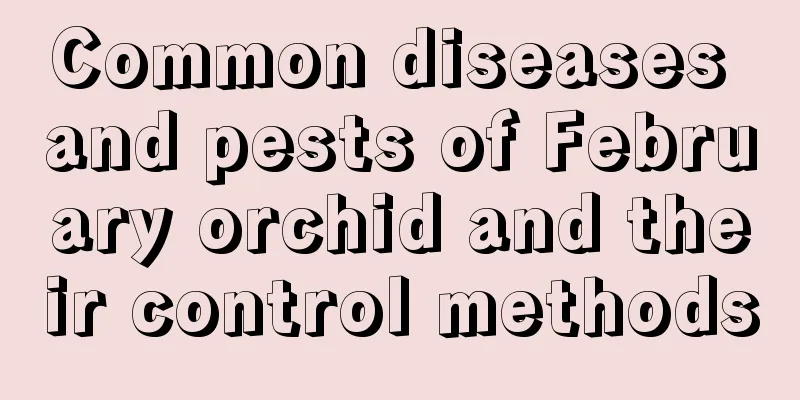Common diseases and pests of February orchid and their control methods

February orchid diseasesymptomDowny mildew often occurs on the lower leaves of February orchid, especially in April when the weather is warm and humid, making it easier for the plants to become infected. When the disease occurs, irregular yellow-green spots will appear on the leaves, followed by a white downy mildew layer on the back of the spots, causing the stems and leaves to become swollen and the mosaic leaves to become deformed. Prevention and treatment methodsAppropriately control the planting density, ensure ventilation and light transmission, and prune in time when the density is high. Keep it dry during maintenance. Excessive humidity can easily cause fungal infection. Spray the pesticide in time when the disease occurs. You can choose metalaxyl mancozeb wettable powder, Guoguang, etc. Spray once every 7 to 10 days and use it continuously for 2 to 3 times. February orchid pestssymptomAphids are definitely the most troublesome problem for February orchids. Once they are infected, the leaves and flowers are densely covered with them. It is disgusting to look at, not to mention eating! In the later stage, aphids suck the sap and leave wounds on the leaves, which will infect other diseases. One chain after another, the condition becomes increasingly serious until the plant dies. More importantly, aphids come in different sizes, and some cannot be seen at all if you don’t observe carefully. If the environment is slightly hot and uncomfortable, aphids will be attracted, and it is difficult to prevent them. Prevention and treatment methodsMethod 1: Citrus water. February cymbidium is edible. The easiest way is to spray it with pollution-free pesticides. Soak the orange peel in a sealed container for a few hours, then spray it directly. Pay attention to cleaning between the leaves and branches. After spraying thoroughly, spray the back of the leaves. Spraying 2 to 3 times will be effective, which is both environmentally friendly and eliminates pests. Method 2: If the aphids are stubborn, you have no choice but to spray pesticides. The February orchid in your home can be moved outdoors, sprayed with medicine, and then moved back indoors after it dries. The commonly chosen medicines include Huhuashen, or people can choose on their own in the store. |
<<: Common pests of delphinium and their control methods
>>: Canna Pests and Control Methods
Recommend
How to prune Pteris fern? Pruning time and method
Pteris fern pruning time Autumn is the best time ...
How to care for and water jasmine?
Jasmine is a relatively easy plant to care for, b...
When is the best time to plant white radish?
White radish is a very common vegetable in rural ...
How to trim the bear's paw
When to prune the bear's paw If you want to p...
Kalanchoe cultivation time
Kalanchoe , also known as Christmas Kalanchoe, is...
How to grow catharanthus truncatus in autumn
1. Ensure lighting When growing catnip in autumn,...
How to prepare organic matrix soil and make the formula (steps)
Requirements for soil preparation The preparation...
How many kilograms of sesame are generally produced per mu? How much can the market price bring in?
Sesame yield per mu Sesame is divided into white ...
Why is the lucky tree shedding its leaves?
Light causes The lucky tree is a light-loving pla...
When to sow chrysanthemum seeds
1. Sowing time The best time to sow chrysanthemum...
How to care for bird's tongue orchid in winter
temperature: Bird's tongue orchid has relativ...
The difference between Fraxinus chinensis and Ligustrum lucidum
1. Differences in tree trunks Fraxinus chinensis ...
What to do if nasturtium grows too tall
Causes of Nasturtium Leggy Growth Insufficient li...
The flower language and legend of Heron
The flower language of Heron Mystery, persistence...
Cultivation methods and precautions of the colorful iron tree
The seven-colored dracaena is relatively easy to ...









